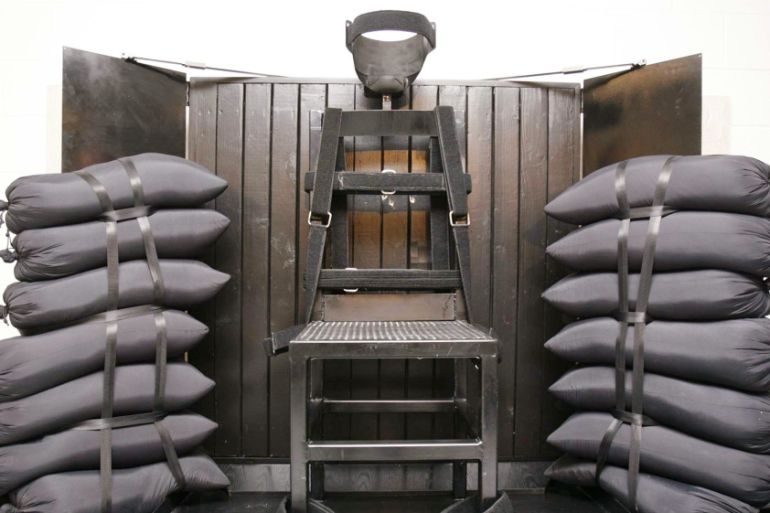Death penalty in US: New Mexico defies nation’s mood
While New Mexico thinks about reinstatement, public support for capital punishment across the US is on the decline.

New Mexico has taken a first step towards reinstating capital punishment in the US state, a move which, if successful, would defy a national trend that has seen support for capital punishment wane in recent years.
During a state budget battle in the early hours of Thursday morning, the House of Representatives on a 36-30 vote along party lines agreed to bring back the death penalty.
Keep reading
list of 4 itemsPalestinian citizen of Israel detained for posts about GazaPalestinian citizen of Israel detained ...
Is Israel acting like the ICC is ‘only for Africa and thugs like Putin’?Is Israel acting like the ICC is ‘only ...
‘We will win’ South Africa election: ANC confident despite ‘missteps’‘We will win’ South Africa election: ANC ...
The motion was put on hold, however, after the Democratic-controlled New Mexico Senate refused to take it up in a session that was primarily concerned with budget deficits. It may have to wait until a new session early next year.
In the aftermath of the murder of two New Mexico police officers in August, and the shocking sexual assault, murder, and mutilation of a 10-year old girl the same month, Republican Governor Susana Martinez and her legislative allies have been pushing to enact harsher criminal justice punishment.
The new policy would bring back capital punishment by lethal injection for individuals convicted of murdering police officers, corrections officers, or children.
‘Backwards and retrogressive’
Anti-death penalty groups reacted swiftly to the decision.
Peter Simonson, executive director of ACLU of New Mexico, called the decision a “backwards and retrogressive bill to reinstate the death penalty in New Mexico”.
“With the overwhelming support of New Mexico voters, the legislature abolished the outdated, costly, and ineffective practice of capital punishment in our state nearly eight years ago,” he said.
In 2009, New Mexico abolished capital punishment under then Democratic Governor Bill Richardson.
But even if the state legislators in New Mexico were able to take up the measure again and pass it, it would be a departure from a national mood that is slowly turning against the practice.
READ MORE: My life after 44 years in prison
Illinois, Connecticut, Maryland, and Delaware all banned capital punishment after New Mexico did, while even Nebraska, a Republican stronghold, saw capital punishment abolished in 2015 after the legislature overrode a veto from Republican Governor Pete Ricketts.
Next month, voters in California could make it the next state to drop the death penalty in a scheduled ballot initiative vote.
All told, there remain 30 states that allow capital punishment.
But the declining national support of the policy was made clear in a study released last week by the Pew Research Center.
It found that support for death penalty in the US was at its lowest level in four decades, dipping just below 50 percent. The 42 percent of Americans now opposed to the practice is the highest total since 1972.
While many states have long allowed the death penalty as a form of punishment, the practice became especially common in the 1990s, a decade which saw a bipartisan consensus on the need to get more stringent on criminal sentencing.
In 1994, according to Pew’s numbers, 80 percent of Americans said they supported the practice.
According to the Death Penalty Information Center, 1999 saw the highest number of executions nationwide, at 99, since 1976.
But in recent years, the number of executions and the number of people sentenced to death has dropped rapidly, partly a result of changing social mores but also the effect of many pharmaceutical companies’ refusal to sell execution drugs to states.
Political support
While capital punishment has not figured too much in the 2016 presidential race, both Democratic candidate Hillary Clinton and Republican candidate Donald Trump support the policy, although they have discussed it infrequently.
Clinton’s support of the policy is at odds with the Democratic Party – which officially made abolishment of the death penalty a part of its platform during a July vote – as well as progressive opinion, as only 34 percent of Democrats polled by Pew support it.
Still, her public support has been rare and even then lukewarm at best.
When asked about her policy in March during a CNN Town Hall meeting by a man who had been exonerated from death row, Clinton hedged.
She suggested that she would be glad if the states or the US Supreme Court outlawed the practice, but that she thought in extreme cases, like terrorism-related murder convictions, it could be justified.
For Trump, his support of capital punishment can be seen in the broader context of his self-declared “law-and-order” candidacy. He has largely discussed his support for the death penalty in relation to police killings.
During a speech last December, Trump said as president he would sign an executive order mandating the death penalty for someone convicted of killing a police officer.
Although that would be of dubious legality according to the US Supreme Court, which has prohibited mandatory death sentences, his overall stance may not harm him with Republican voters.
According to Pew, a large majority of Republicans, at 72 percent, still support the death penalty.
National elections aside, the overall trend, as the Pew study indicates, is still one of scepticism towards executions, and where it is debated it is likely to remain at the state level.
Whether New Mexico becomes the first state in more than 40 years to reinstate capital punishment after outlawing it, remains to be seen.